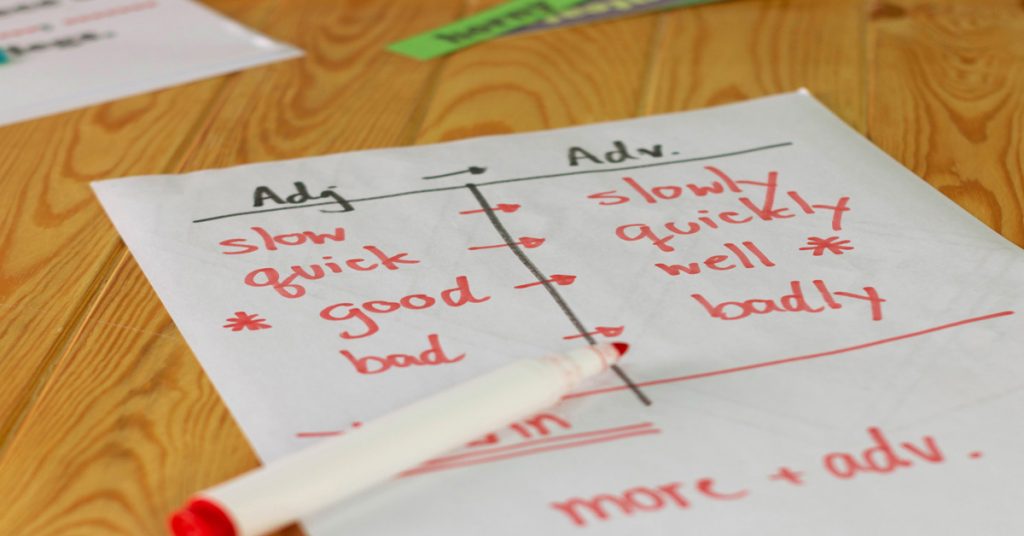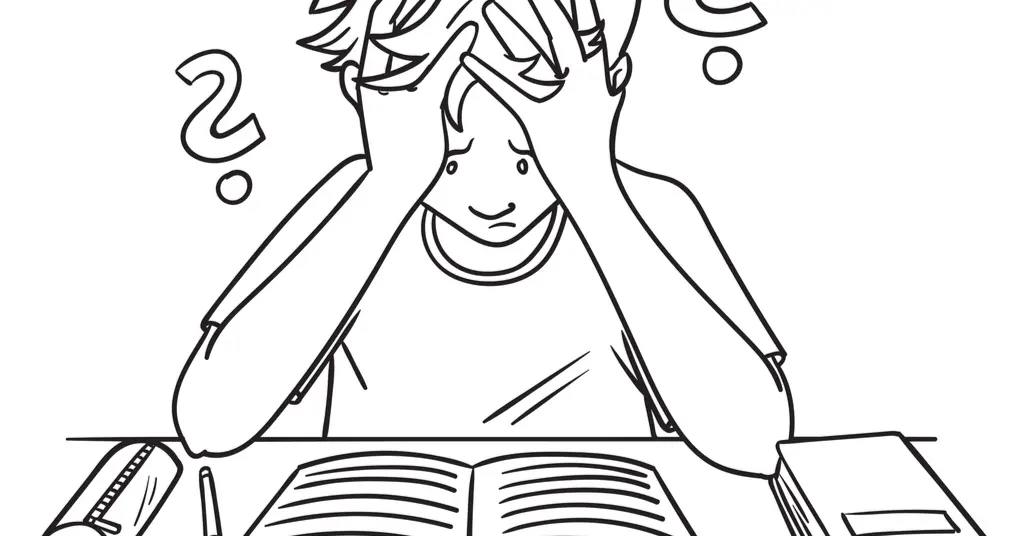What Are Adjectives and Adverbs on the SAT?
On the Digital SAT, questions involving adjectives and adverbs test whether you can understand how words function inside a sentence. These questions usually appear in the RW section and focus on whether the word choice correctly matches what is being described.
Many SAT adjective and adverb questions feel tricky because both answer choices may sound acceptable at first glance. However, only one choice will follow the grammatical rule the SAT expects. To answer these questions consistently, as you would learn from a comprehensive SAT Study Guide, you need a clear understanding of what adjectives and adverbs do, along with the common ways they appear on the test.
Adjectives on the SAT
On the Digital SAT, adjectives are often placed far away from the words they modify or after "linking verbs" to trick you into choosing an adverb. These questions specifically test your ability to ignore how a sentence "sounds" and instead verify that the word in question is modifying a noun or concept.
How Adjectives Function
An adjective is a word that describes or gives more information about a noun. On the SAT, adjectives are used to describe people, objects, ideas, or qualities mentioned in a sentence. If a word is describing a noun/pronoun, the correct choice will always be an adjective.
Example: The detailed report clearly explained the findings.
In this sentence, ‘detailed' describes the noun 'report'. As it modifies a noun, an adjective is required. Using an adverb here would be incorrect, even if it might sound natural.
The SAT adjectives commonly appear in these positions:
- Before a noun: a convincing argument
- After a linking verb: The explanation was clear.
- As part of a description of an idea or quality: a significant improvement
One important thing to understand is that adjectives on the SAT are not limited to describing physical traits. They are often used to describe abstract qualities such as ideas, arguments, or tones. For example, phrases like a logical conclusion, a persuasive argument, or a significant discovery all rely on adjectives to describe nouns. Besides, there are different kinds of adjectives you'll see on the SAT Exam:
- Descriptive adjectives that describe qualities, such as accurate, efficient, or complex
- Comparative and superlative adjectives like stronger or most effective
- Evaluative adjectives that describe ideas or arguments, such as logical, persuasive, or flawed
As adjectives frequently follow linking verbs, students often mistake these for adverbs. Recognizing that adjectives describe nouns, even when they come later in the sentence, is a key skill for SAT RW questions.
Adverbs on the SAT
Adverbs appear on the SAT primarily to test whether you can distinguish between modifying an action and modifying a noun. Test makers frequently use adverbs as "trap" answers in sentences where students rely on the "-ly" ending rather than checking if the word actually describes a verb or another modifier.
How Adverbs Function
An adverb is a word that describes a verb, an adjective, or another adverb. On the SAT, adverbs are frequently used to show how an action is performed or to modify the intensity of a description.
Example: The scientist explained the concept clearly to the class.
Here, ‘clearly' describes the verb ‘explained'. As the word is modifying an action, an adverb is required. Using an adjective in this position would be grammatically incorrect.
Many SAT adverbs end in -ly, which makes them easier to recognize. However, the SAT also tests whether students rely too heavily on that pattern. Some words ending in -ly can still be wrong if they do not correctly describe the word they are attached to.
Common ways adverbs are used on the SAT include:
- Describing actions: quickly, carefully, clearly
- Modifying adjectives: highly effective, extremely important
- Modifying other adverbs: very clearly, quite efficiently
A common mistake on the SAT is assuming that any word ending in -ly is automatically correct. The SAT does not reward what sounds right. It rewards correct grammatical function. If the word describes an action or modifies another descriptive word, an adverb is needed. Otherwise, it is not.
Understanding how adjectives and adverbs function in SAT sentences prepares you to apply the core rule for choosing between them, which is where most students either gain or lose easy points.
The Core Rule for Choosing Adjectives vs. Adverbs on the SAT
When the SAT asks you to choose between an adjective and an adverb, it is testing whether you can identify what a word is describing in a sentence. Almost every adjective-and-adverb question on the SAT can be solved by following one simple rule and applying it carefully. Instead of reading the sentence for how it sounds, slow down and look at the role the word plays. Once you do that, the correct answer usually becomes obvious.
Choose an Adjective to Describe a Noun
Use an adjective when the word is describing a noun. This is true even if the adjective does not appear directly next to the noun or if the sentence sounds more natural with an adverb.
Example: The committee reached a final decision after hours of discussion.
Here, ‘final' describes the noun ‘decision'. As the word is modifying a noun, an adjective is required.
Adjectives on the SAT often appear in places that make students second-guess themselves. For example, adjectives frequently come after verbs that do not show action but instead connect the subject to a description. In these cases, the adjective is still describing the noun, not the verb.
Example: The explanation was clear.
Although ‘was' is a verb, it is not an action verb. The word ‘clear' describes ‘explanation', which is a noun. That means an adjective is correct.
So, when choosing an adjective on the SAT:
- Look for the noun being described
- Ignore how the sentence sounds in everyday speech
- Remember that adjectives describe things and ideas, not actions
- If the word answers the question “what kind?” or “which one?” about a noun, the SAT wants an adjective.
Choose an Adverb to Describe an Action or Quality
Use an adverb when the word is describing a verb, an adjective, or another adverb. On the SAT, adverbs most commonly describe how an action is performed or how strongly something is defined.
Example: The student responded quickly to the question.
Here, ‘quickly' describes the verb ‘responded'. As it modifies an action, an adverb is required. Adverbs can also modify adjectives, which often appear in more formal SAT RW.
Example: The argument was extremely persuasive.
In this sentence, 'extremely' describes the adjective 'persuasive', not the noun 'argument'. That makes an adverb the correct choice.
When choosing an adverb on the SAT:
- Identify the action or descriptive word being modified
- Watch for verbs that show action, such as run, explain, or respond
- Do not assume a word is correct just because it ends in -ly
- If the word answers the question “how?”, “to what extent?” or “in what way?” The SAT almost always wants an adverb.
Linking Verbs: When the SAT Still Wants an Adjective
Linking verbs are one of the most common traps in adjective-and-adverb questions on the SAT. Linking verbs do not show action. Instead, they connect the subject of a sentence to a description.
Common linking verbs on the SAT include:
- be (is, are, was, were)
- seem
- appear
- feel
- become
As linking verbs connect the subject to a description, the word that follows them describes a noun, not an action. That means the SAT expects an adjective, not an adverb.
Example: The solution seems simple.
Even though 'seems' is a verb, 'simple' describes the noun 'solution'. An adverb like simply would be incorrect here.
These sentences often sound incorrect to students because adverbs are commonly used in spoken English. On the SAT, however, grammar rules matter more than sound. When you see a linking verb, pause and check whether the word is describing the subject. If it is, choose an adjective. Mastering this distinction is one of the fastest ways to eliminate wrong answer choices and avoid losing easy points.
Practice Questions: Choosing Adjectives vs. Adverbs on the SAT
The fastest way to lock in the difference between adjectives and adverbs is to practice identifying what a word is actually describing in real SAT-style sentences. As you work through these questions, do not rush to the answer choice that sounds right. Instead, pause and ask yourself what word the underlined term is modifying. That single step is usually enough to eliminate the wrong option. Below are UWorld’s SAT-style practice examples similar to what you will see in the Digital SAT RW section.
Passage
To most observers, it might seem like the net-casting spider's small web consists of the same silk spun by other arachnids that make larger, fixed ______ the net-casting spider uses a unique, stretchy silk to construct a net between its front legs that has more elasticity, enabling the net to expand tremendously when the spider lunges to capture prey. Biologist Jessica Garb and her research team hypothesize that this superior stretchiness comes from proteins in its silk.
Question
Which choice completes the text so that it conforms to the conventions of Standard English?
| A. webs, however, | |
| B. webs however, | |
| C. webs, however; | |
| D. webs; however, |
Explanation
Rule: A conjunctive adverb that joins two independent clauses must have a semicolon before it and comma after it.
Identify the independent clauses to choose punctuation that joins them correctly and includes "however" with the clause that expresses contrast.
The conjunctive adverb "however" comes between two independent clauses and expresses a shift from the presumed similarity between net-caster's silk and the silk of other spiders. Because "however" indicates a contradiction of what was previously stated, it belongs with the second independent clause describing the features of the net-caster's silk that contradict what might be perceived about it.
That means the semicolon separating the clauses must come BEFORE "however," making webs; however, the correct answer.
(Choices A) Adding a comma between the independent clauses results in a comma splice error, leaving the two independent clauses separate rather than properly joined.
(Choice B) Lacking a semicolon or a FANBOYS conjunction to join the independent clauses results in a run on sentence error.
(Choice C) This answer joins the independent clauses with a semicolon, but it incorrectly separates "however" from the independent clause that expresses the contradiction.
Things to remember
Include a transition suggesting contrast or contradiction with the clause describing those differences and join independent clauses with a semicolon before the conjunctive adverb.
Passage
Superconductors, materials that transmit electricity without any resistance to the flow of the electric current, only work at extremely low temperatures. In a 2023 article, ______ asserts that researchers have made progress toward developing superconductors that can function at room temperature and still carry up to five times as much electricity as current cables.
Question
Which choice completes the text so that it conforms to the conventions of Standard English?
| A. physicist, Mishkat Bhattacharya | |
| B. physicist Mishkat Bhattacharya, | |
| C. physicist Mishkat Bhattacharya | |
| D. physicist, Mishkat Bhattacharya, |
Explanation
Rule: No comma is placed between an adjective and the noun it describes. Also, a single comma should not be placed between a sentence's subject and its main verb.
Notice that each of the answer choices involves deciding whether a comma is needed before and/or after "Mishkat Bhattacharya," so determine how this name is functioning in the sentence.

Because "physicist" is used as an adjective to describe Mishkat Bhattacharya's occupation, there should be no comma to separate "physicist" from the sentence's subject. Likewise, no comma should separate the subject "Mishkat Bhattacharya" and the sentence's main verb "asserts." Therefore, the correct answer is the one without any commas: physicist Mishkat Bhattacharya.
(Choice A) Placing a single comma in front of "Mishkat Bhattacharya" would incorrectly separate the adjective "physicist" from the noun it describes.
(Choice B) Placing a single comma after "Mishkat Bhattacharya" would incorrectly separate the sentence's subject and main verb "asserts."
(Choice D) A comma before "Mishkat Bhattacharya" would incorrectly separate the adjective "physicist" from the noun it describes. A comma after "Mishkat Bhattacharya" would incorrectly separate the sentence's subject from its main verb "asserts."
Things to remember:
Commas should not be used to separate an adjective from the noun it describes or a sentence's subject from its main verb.
Passage
The majority of Mayan traders came from the middle class, exchanging utilitarian goods locally and regionally. Because long-distance trading expeditions were considered more ______, these journeys were often reserved for the elite and controlled by the royal family, who decided what to do with the acquired luxury items.
Question
Which choice completes the text with the most logical and precise word or phrase?
| A. understated | |
| B. indefinite | |
| C. extensive | |
| D. prestigious |
Explanation
Eliminate answers that have a meaning not supported by the text. The answer that is left should have a meaning that works in context.
Based on the context, the word that best completes the sentence will show the contrast between middle-class merchants who traded within the region and the upper-class elites who engaged in long-distance travel.
| (Choice A) understated = avoiding obvious emphasis. (Ex. The minor actor's performance was so understated that he didn't draw attention away from the main cast.) | Because long-distance traders brought back luxury items for the royal family, those expeditions would have been noticeable, not understated. |
| (Choice B) indefinite = not precise; having no set limits. (Ex. The length of our trip is indefinite, so we haven't booked a return flight.) | The time the long-distance journeys took may not have had a specified limit, but they did have a precise purpose: to exchange goods. |
| (Choice C) extensive = extending over a wide range. (Ex. In the spring, the spread of Texas bluebonnets is extensive, and they can be seen beside highways across the state.) | Just because long expeditions covered a wide range of territory doesn't suggest a reason why they were reserved for the elite, so this answer isn't supported by the text. |
| (Choice D) prestigious = having high status. (Ex. An Academy Award is one of the most prestigious honors an actor can receive.) | The text explains that long-distance trading expeditions were often "reserved for the elite," who are people of high status, so this word fits the context. |
Things to remember:
Choose the answer with a definition that works based on the context.
Passage
J. J. Grandville, a French graphic artist of the nineteenth century, created a chilling picture criticizing censorship that displays the ______ quality many found so disturbing in his art: some people are drawn with bird-like heads of bellows, used to enhance the small fire, as they grimly burn books under the cover of darkness in an image of cult-like behavior.
Question
Which choice completes the text with the most logical and precise word or phrase?
| A. humorous | |
| B. literal | |
| C. eerie | |
| D. sacred |
Explanation
Examine the details used in describing the picture to find clues indicating which word best conveys the drawing's qualities.
The description uses words like "disturbing," "chilling," "cult-like," "grimly," and "darkness" to characterize Grandville's art and this image in particular. These words indicate that Grandville's picture is weird, creepy, and frightening—qualities best described as eerie.
(Choice A) Humorous = funny or hilarious. Depicting people as bellows could be comical, but the drawing is described as "disturbing," with people gathering to "grimly" (sternly) burn books at night.
(Choice B) Literal = factual. Although burning books has occurred in various times and places, drawing people as bellows is imaginative, not literal.
(Choice D) Sacred = holy. The "chilling" qualities of people with bird-like bellows "grimly" burning books amid "darkness" suggest something evil rather than something holy.
Things to remember:
Details in the text provide context clues about a word's precise meaning.
Passage
Blinking is typically considered an involuntary, random action. For years, researchers debated whether people could be conditioned to blink more consistently. In a 2018 experiment, cognitive scientist David Hoppe and his colleagues discovered that participants could be conditioned to blink ______ when focusing on a gray dot moving in a circle.
Question
Which choice best completes the text with the most logical and precise word or phrase?
| A. predictably | |
| B. healthily | |
| C. vigorously | |
| D. easily |
Explanation
Consider the text's ideas and identify any words that have a similar meaning to one of the answer choices.
The text begins with the idea that blinking is considered "an involuntary, random action." The next sentence speculates about whether people can be trained "to blink more consistently." Then a specific experiment is discussed in which participants are trained to blink in a certain way that is more consistent (regular and expected). The answer choice with a similar meaning to "consistently" is predictably.
(Choice B) Whether or not blinking is a healthy activity wasn't debated by the researchers.
(Choice C) Blinking vigorously means doing so with great energy. However, the debate was not about whether blinking could be done with great energy, but whether it could be done more consistently.
(Choice D) The text contrasts random with consistent blinking; the researchers weren't debating whether blinking is easy.
Things to remember:
The correct answer will be discussed in the text and will often have a similar meaning to one or more words found in the text.
Common SAT Mistakes with Adjectives and Adverbs (And How to Fix Them)
Most adjective and adverb questions on the SAT are missed for the same few reasons. These mistakes are not random. They stem from predictable habits that work in everyday English but fail on standardized tests. A structured SAT prep course can help you break these habits, making adjective and adverb questions much easier to handle under time pressure.
Below are the most common SAT mistakes students make with adjectives and adverbs, along with clear ways to avoid them.
- Choosing Based on What Sounds Right: Do not trust how the sentence sounds. Before looking at the answer choices, identify what the word is supposed to describe. If you cannot clearly name the word being modified, you are guessing.
- Assuming Words Ending in -ly Are Always Correct: Ignore word endings and focus on function. The SAT does not care whether a word looks like an adverb. It cares whether the sentence is describing a noun, an action, or another descriptive word.
- Treating Linking Verbs Like Action Verbs: Pause whenever you see verbs like is, seems, appears, or feels. These verbs usually connect the subject to a description, which means the SAT typically expects an adjective.
- Missing What the Word Is Actually Modifying: Mentally strip the sentence down to its core structure. Remove extra phrases and identify which word the description is attached to before choosing an answer.
If you slow down just enough to check these points before answering, adjective and adverb questions stop being risky. The SAT uses the same patterns repeatedly, and once you recognize them, the wrong choices become easy to eliminate. Treat this list as a quick mental checklist, and you can turn what is usually a source of mistakes into a consistent source of points.
SAT Adjectives vs Adverbs: Frequently Asked Questions (FAQs)
Are adjective and adverb questions common on the SAT?
Yes, adjective and adverb questions are common on the Digital SAT Reading and Writing section. They usually appear as word choice or grammar questions rather than direct grammar identification. The SAT likes these questions because they test whether you understand how words function in a sentence, not whether you memorized grammar rules. These questions are often subtle, which makes them easy to miss if you rely on instinct. With the right approach, they also become some of the easiest points to earn.
Why does the SAT assess the distinction between adjectives and adverbs?
The SATs adjective and adverb usage because it reflects real reading and writing skills. Strong writers choose words based on meaning and function, not just what sounds right. This rule helps the SAT measure how carefully you read sentences and whether you understand relationships between words. It also reveals whether you can apply grammar rules in context, which is more important than knowing definitions. In short, the SAT employs this rule to distinguish between careful readers and those who rush to guess.
How do I know when a verb is a linking verb?
A verb is a linking verb when it connects the subject of a sentence to a description rather than showing an action. Common linking verbs on the SAT include forms of be, along with seem, appear, feel, and become. A quick way to check is to determine whether the verb indicates an action or simply describes a state or condition. If the word after the verb describes the subject, the verb is likely linking. In those cases, the SAT usually expects an adjective, not an adverb.





